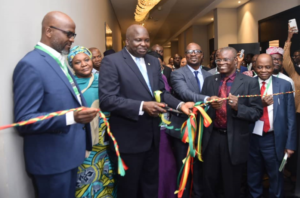
The Department of Petroleum Resources (DPR) has warned that the era of using fake reports from accredited laboratories by dubious vendors is over, as it threatened that anyone caught in the act should be ready to face the full wrath of the law.
Speaking during a workshop organized by the DPR for stakeholders in the laboratory practice, the Acting Director of DPR, Mr. Shakur Ahmad Rufai, warned that it would no longer be business as usual since the agency will leave no stone unturned to ensure that laboratories that do not meet the minimum required standards are shown the way out.
He admonished laboratory stakeholders to begin to chart a definitive and sustainable path towards uncompromised and consistent quality of service and integrity of results.
“Instructively, laboratory practice in the Nigerian oil and gas Industry should not only be viewed as a business or money-making venture but should be seen as a critical and sensitive component which inputs are critical for decision-making across the oil and gas value chain,” he said.
Rufai who was represented by the Head, Health Safety and Environment (HSE), Dr. Musa Zagi, noted that the quality and integrity of the data/results churned out from laboratories in the oil and gas sector of the economy is a critical ingredient in decision making (for both regulators and operators) without which there can be no real value addition and sustainability.
He disclosed that the DPR has put in place, machinery to ensure Good laboratory practice in the Nigerian oil and gas Industry which includes the accreditation and permitting process for organizations/ companies rendering laboratory services in the sector has been further strengthened by the oil and gas laboratories Stakeholders’ Workshop since the first workshop which was held in 2015.
Also reacting, the Head, Laboratory Services, DPR, Mr. Abdurahman Abiodun, decried a situation where some International Oil Companies (IOCs) deploy unapproved chemicals for analysis, warning that companies that sell dangerous chemicals and the buyers will be sanctioned if caught in the act. Abiodun regretted that some operators compromise analytical process, test results in connivance with consultants and operators.
According the DPR laboratory chief, one other shortcoming identified by his team was the lack of capacity to repair and maintain high-tech and specialised laboratory equipment which was also highlighted as a major challenge that laboratories need to strive to upgrade by obtaining relevant certifications, including ISO 17025:2017 certification.
He again restated the need to ensure that laboratory practice in the Nigerian oil and gas industry conforms to Good Laboratory Practice (GLP) requirements. Abiodun admonished operators to avoid reflecting the lowest bidder syndrome (Poor Contract Cost) on the quality of services rendered, saying laboratory operators and environmental consultants are advised to form association to address shared values.
“The need for regulators and joint venture partners to ensure adequate budgetary allocation to environmental/laboratory investigations to guarantee quality delivery of project while he enjoined operators and service providers to present more realistic budgets and bids respectively,” he said.
On waste handling, he said most laboratories handle waste in an improper manner with majority of them having no Memorandum of Understanding (MoU) with accredited waste managers, no waste manifest and lack of waste disposal certificates (hazardous waste).
As part of its roadmap for improvement of laboratory practice in Nigeria, Abiodun disclosed that, the DPR will henceforth conduct site suitability, accredit and de-list laboratories based on Good Laboratory Practice (GLP) requirements, tackle the lowest bidder issue through Health Safety and Environment (HSE) managers’ forum.
Others are; ensure that operators engage laboratories for environmental compliance monitoring exercise and that lube blending plants have the minimum equipment for testing their products.
Going forward, he said the Department will track all the processes of laboratories from sample collection stage to result submission in order to ensure that the best international practices are adhered to.




